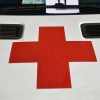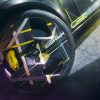Play Video
1:30
‘Compelling evidence’ vaccine programme is working in Scotland, says Sturgeon – video
Scotland is “on a path back” to near elimination of coronavirus, according to Nicola Sturgeon, as she referred to “compelling evidence” that the vaccination programme was starting to have an effect on reducing death rates.
At the Scottish government’s daily briefing on Thursday, the first minister said she had always favoured an elimination strategy when dealing with Covid-19 – “by which I mean suppress to as low as possible a level and then try to keep it there” – and that research suggested this had been achieved in Scotland last summer.
“The work that’s been done around genomic sequencing would say [it is feasible], because it shows we actually achieved that in the summer in Scotland last year. Most of the strains of the virus that had been circulating in Scotland were eliminated and what happened is that it reseeded mainly from travel, from overseas travel and some from travel across UK, and that will have happened in both directions.”
“We know we can do that and we are some way off it, but we are on a path back to that suppression to very low levels. The challenge is: how do you keep it there?”
Sturgeon said this would involve a combination of strategies, including the test-and-protect system (as of today, anyone who is identified as a close contact of somebody who has tested positive for coronavirus will be asked to get tested too), travel restrictions “perhaps for some time yet”, as well as continuing restrictions such as face coverings, stringent hygiene and social distancing as the country eases out of lockdown.
She reiterated that her government’s planned route map for loosening restrictions, which will be published next week, would be cautious, with changes dependent on “data not dates”. Sturgeon said: “I want this lockdown to be the last one we need.”
Quick guide Vaccines: how effective is each one and how many has the UK ordered?
Show
Hide
Pfizer/BioNTech
Country US/Germany
Efficacy 95% a week after the second shot. Pfizer says it is only 52% after the first dose but the UK’s Joint Committee on Vaccination and Immunisation (JCVI) says this may rise to 90% after 21 days.
The UK has ordered 40m doses.
Doses Clinical trials involved two doses 21 days apart. The UK is stretching this to 12 weeks.
Oxford/AstraZeneca
Country UK
Efficacy 70.4% 14 days after receiving the second dose. May have up to 90% efficacy when given as a half dose followed by a full dose. No severe disease or hospitalisations in anyone who received the vaccine. There have been concerns it is less effective against the South African variant of the coronavirus.
The UK has ordered 100m doses.
Doses Two, four to 12 weeks apart
Moderna
Country US
Efficacy Phase 3 trial results suggest 94.1%.
The UK has ordered 17m doses, to be delivered in March or April
Doses Two, 28 days apart
Novavax
Country US
Efficacy Phase 3 trials suggest 89.3%.
60m doses ordered by the UK, with distribution expected principally in the second half of the year
Doses Two
Janssen (part of Johnson & Johnson)
Country US
Efficacy 72% in preventing mild to moderate cases in US trials but 66% efficacy observed in international trials. 85% efficacy against severe illness, and 100% protection against hospitalisation and death.
30m doses ordered by the UK
Doses: One, making it unique among Covid vaccines with phase 3 results so far
Photograph: Stéphane Mahé/X02520
Was this helpful?
Thank you for your feedback.
During the briefing, Sturgeon pointed to weekly data showing a significant decline in care home deaths, with the proportion of those dying in such facilities falling from 34% at the beginning of January to 13% last week.
While a cross-border travel ban has been in place since before Christmas, the impact of travel on virus spread has been raised again as England and Scotland diverged on international quarantine plans.






















































Свежие комментарии